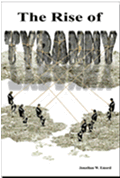WASHINGTON'S RESPONSE TO A SNOW STORM
By
Attorney Jonathan Emord
March 10, 2010
NewsWithViews.com
If you need any proof that government planning fails look at how our nation’s Capitol copes with snow. When snow tops two inches, panic sets in. The news stations announce that “all non-essential government employees” are on “liberal leave” and may bolt from the bureaucracy to their suburban homes. Makes you wonder, doesn’t it? Why are taxpayers footing the bill for “non-essential employees?” Why not let them stay at home and save the taxpayer the expense of their unnecessary labors? Only government employs non-essential employees and proclaims them as such to the world, as if we the taxpayers are so numbed to the idea that unnecessary government surrounds us that we will yawn when word comes that government bureaucrats have been sent home because they aren’t needed at work anyway.
In the private sector, if your boss tells you that you are a “non-essential employee” that pretty much means you are out of a job. Not so in the federal government. Most people who work for the federal government are classified as “non-essential employees,” meaning that if a crisis hits Washington, they can go home and watch on television. Non-essential federal employees are a largely useless cushion surrounding essential federal employees, sort of like belly fat.
The public schools close in the national Capitol area not because snow has hit the ground but because someone said that snowfall was imminent. Power lines, draped from poles (not placed underground), predictably fail, leading to mass power outages. Year after year some wise person asks why the power lines are not placed underground and a parade of bureaucratic answers proceeds, assuring people that there is no way this side of the free market that anyone could possibly get the lines in the ground without raising taxes on everyone and everything (including area flora and fauna). You would think snowfall a new phenomena in Washington, D.C., but it comes every year.
You would think Washington, D.C. bereft of funds to pay for snow removal, but it is awash in everyone’s tax money and has spent billions of dollars over the years on emergency preparedness. Despite all the money spent, Washington, D.C. is still not prepared for an emergency let alone a good rain or a few inches of snow. You would think the government monopoly power companies bankrupt because they complain that they do not have enough money to put power lines underground, but they are very wealthy indeed.
In short, the government planners cannot cope with snow precisely for the same reason that they cannot cope with terrorism, unemployment, health care, or economic recovery. Snow in Washington, D.C. is routine. The federal and state governments always describe it as manageable in advance of the first snow flake and then bemoan when the snow falls that it is for one reason or another beyond what anyone could reasonably have anticipated. Then, after they fall over themselves in ineptitude, they invariably conclude that the problem is inadequate funding, manpower, departmental authority, or jurisdiction.
You see power in Washington is not electric or mechanical, it is political. So snow, like every other problem is search of a solution, is just another excuse for more political clout. Snow, like terrorism, unemployment, health care, and economic recovery is never ultimately solved but is always there to combat—the perfect justification for an interminable bureaucracy. This is the common ritual of government, so it should not surprise anyone. The only difference is that in this case the “snow job” the snow bureaucrats pull over on the public has a literal meaning.
When the bureaucrats are liberated for snow days, they show a side of themselves one would never suspect from having viewed them in the office. I worked in the bureaucracy during the Reagan Administration, and I can confirm that slow motion is the bureaucrat’s top speed. But when released from the drab government buildings that employ them on word that snow is coming, they acquire uncharacteristic energy and behave like sharks in chummed waters. They scramble about, half-crazed, attacking the local grocery stores for everything consumable. It is not uncommon to see aisle after aisle decimated of bread, toilet paper, milk, and fruit.
In this last storm, my local Safeway looked like it had been ravaged by terrorists. The bread aisle revealed nothing but crumbs and a few scattered slices, ripped from the plastic, picked over as if by starved birds. The milk department had nary a carton. The paper products were missing, not a toilet paper roll remaining. And the look on people’s faces: scowls everywhere and little eyes darting back and forth. You can guess what they are thinking: What if I cannot buy a mass supply of toilet paper, bread, and milk—how will I survive over the next 24 hours? The bureaucrat has no experience with deprivation because a government salary is there regardless of the state of the economy. It is a revelation to them to learn that some people do not eat out of choice—its called fasting or dieting. Bureaucrats must have food; they ordinarily do not diet or fast. The notion that food might not be available with the reliability of government payroll shocks their consciences and provokes their more primitive selves.
People here often remark that they do not understand why every time it snows the nation’s Capitol shuts down (indeed, a good rain can send folks racing for the exits to head to their suburban homes). People complain that there are too few multi-lane highways leading into the nation’s Capitol. They complain that there are too few ploughs operating on the roads. They complain that the power lines are above ground. They complain year after year but they accept the government promise that these problems are being addressed by able public servants. Largely because they too are public servants they excuse the fact that the problems never go away despite all the money spent on them. Deep down inside, they know why. Would they ever solve a problem? Could they?
I used to lament at heavy snow fall in Washington, worrying about how hard it would be to go to and fro given the crazed reaction of locals to the slightest inclement weather. The near constant growth in the federal government has caused me to view bad weather differently of late. Snow, it seems, is my friend. It is a very effective means to reduce government growth and deprivation of life, liberty, and property.
| Subscribe to the NewsWithViews Daily News Alerts! |
It does the rest of the country great good when the non-essential government employees who would otherwise be doing mischief stay at home with their bread, toilet paper, milk, and fruit. Its good when the lights are on in Washington and no one’s home. I often find myself singing Sammy Cahn’s classic hit, “Let it Snow! Let it Snow! Let it Snow!”
� 2010 Jonathan W. Emord - All Rights Reserved
















